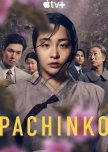Pachinko - An Epic Historical Saga
Historical epics aren't a new concept. Neither are multigenerational family dramas or period pieces. We've all seen them: programs with meticulously preserved and historically correct set architecture; intergenerational family dramas in which the youngest generation learns about their ancestors and gains a new perspective on themselves; and stories of enslavement, torture, perseverance, and struggle. Pachinko, the newest drama on Apple TV Plus, manages to take all of these tropes and polish them into something incredibly particular and new: a Korean family epic.
We observe the horrors of Japanese occupation through Sunja's eyes. She watches as a kid the arbitrary violence of Japanese police who arrest any Korean accused of speaking out against their occupiers. She is the victim of a racist attack as a teenager in the 1930s (the primary timeframe of the program), and subsequently, after moving to Japan, she and her family live as second-class residents. There's no sugarcoating the history of colonization and conflict between Korea and Japan because of personalities like Koh Hansu (Lee Min-Ho). Koh Hansu's obvious commitment to Japan makes him neither good nor wicked; rather, the way he treats Sunja is the ultimate litmus test of his character.
Pachinko, on the other hand, is motivated not by Sunja's anguish, but by her tenacity in the face of it. Pachinko regularly avoids straying into trauma porn; it's evident that showrunner Soo Hugh recognizes the historical significance of how Sunja's narrative fits within the horrors of the Japanese occupation, but they also recognize that focusing on her misery would obliterate the humanity of her story. Rather of utilizing Sunja to convey a tale about the occupation, Pachinko leans into this being her story, letting her journey to choose how much historical background is provided.
The experience of an immigrant who goes to a country where she doesn't know the language and is viewed as a second-class citizen is not the same as that of a second-generation guy who battles to reconcile his Japanese and Korean identities. They don't have to be.
We observe the horrors of Japanese occupation through Sunja's eyes. She watches as a kid the arbitrary violence of Japanese police who arrest any Korean accused of speaking out against their occupiers. She is the victim of a racist attack as a teenager in the 1930s (the primary timeframe of the program), and subsequently, after moving to Japan, she and her family live as second-class residents. There's no sugarcoating the history of colonization and conflict between Korea and Japan because of personalities like Koh Hansu (Lee Min-Ho). Koh Hansu's obvious commitment to Japan makes him neither good nor wicked; rather, the way he treats Sunja is the ultimate litmus test of his character.
Pachinko, on the other hand, is motivated not by Sunja's anguish, but by her tenacity in the face of it. Pachinko regularly avoids straying into trauma porn; it's evident that showrunner Soo Hugh recognizes the historical significance of how Sunja's narrative fits within the horrors of the Japanese occupation, but they also recognize that focusing on her misery would obliterate the humanity of her story. Rather of utilizing Sunja to convey a tale about the occupation, Pachinko leans into this being her story, letting her journey to choose how much historical background is provided.
The experience of an immigrant who goes to a country where she doesn't know the language and is viewed as a second-class citizen is not the same as that of a second-generation guy who battles to reconcile his Japanese and Korean identities. They don't have to be.
Vond je deze recentie nuttig?


 1
1























